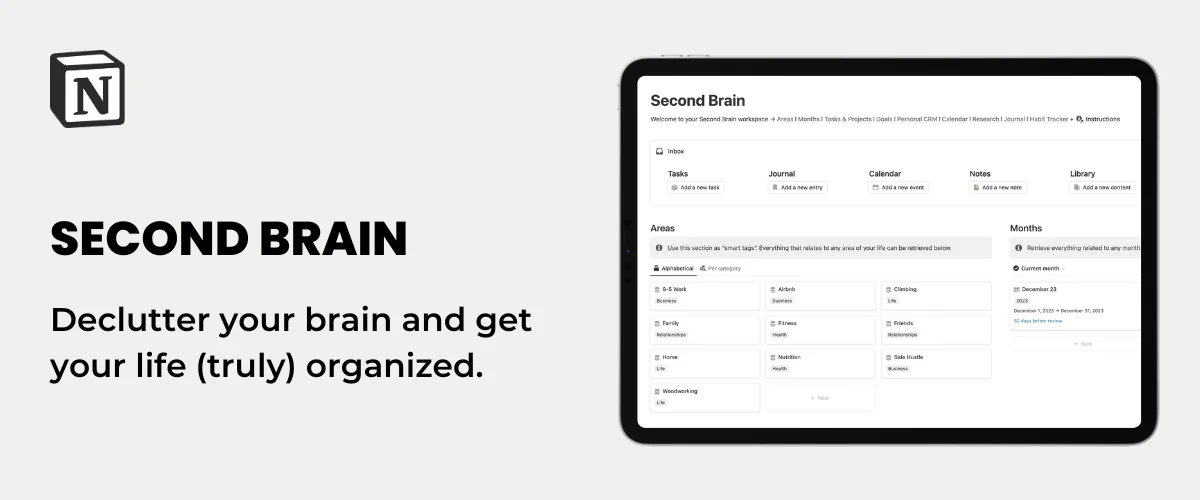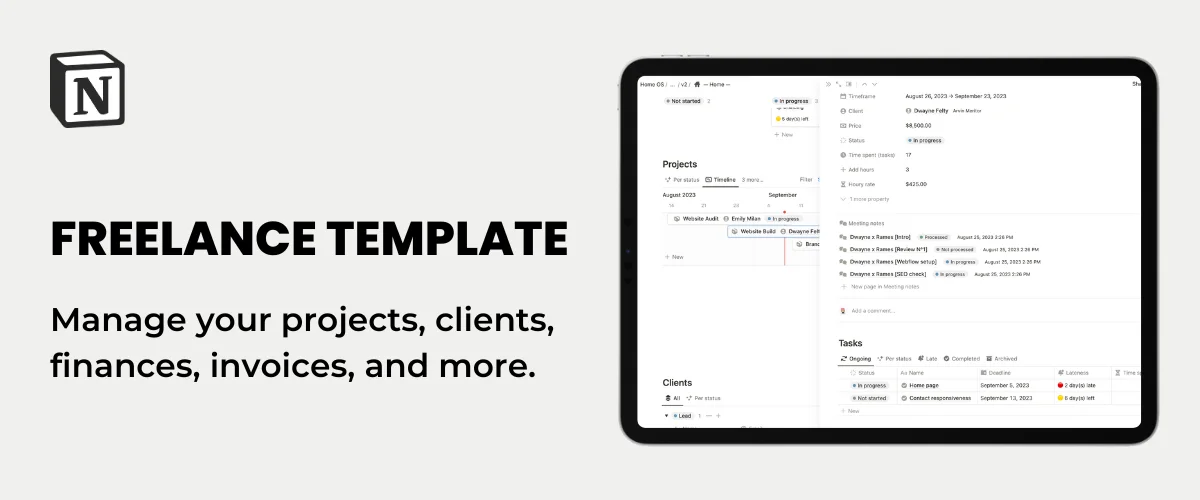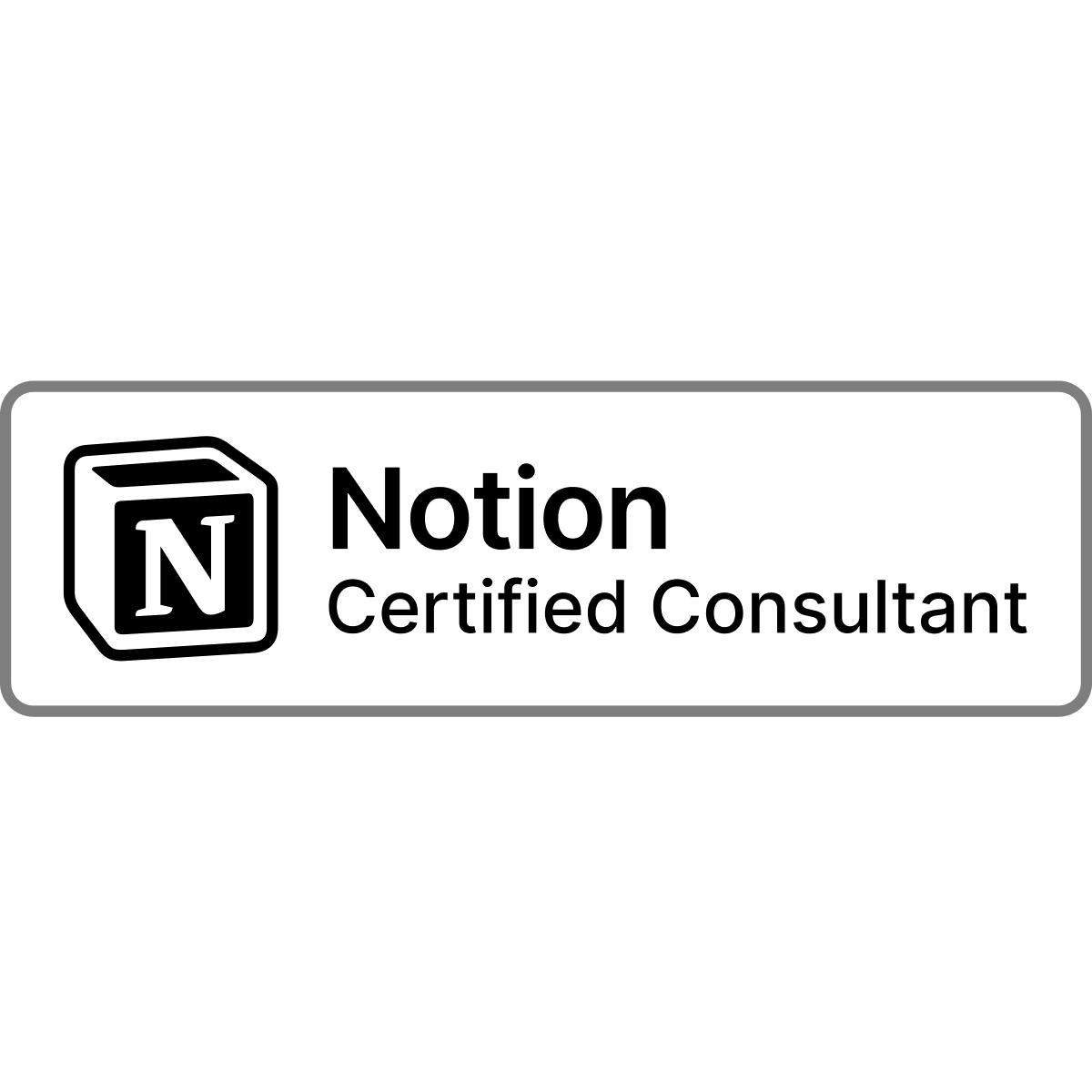
Notion Calendar | Add databases, Work with Teammates, Attach Pages & Shortcuts
Notion Calendar is finally here! Notion Calendar is a new app, not just a feature, which succeeds Cron, the Calendar app they acquired in 2022. If you were already a Cron user, not much has changed (as of January 2024), except for one significant update (we’ll dig into that at the beginning of this post).
Notion Calendar is completely free and available on the web, Mac, Windows, and iOS. They are also working on releasing an Android version. As of today, Notion Calendar only integrates and syncs with Google Calendar accounts. Outlook and iCloud are on their roadmap.
So buckle up, and let’s dig into Notion Calendar’s features!
Key Takeaways
- Retrieve your Notion databases in Notion Calendar: easily connect and sync your Notion databases with Notion Calendar, allowing you to view and manage your tasks and events all in one place.
- Access your teammates' calendars: collaborate seamlessly by overlaying your teammates' calendars with your own, making it effortless to find common availability and schedule meetings.
- Effortlessly work with multiple timezones: whether you're a remote team or interacting with people in different timezones, Notion Calendar simplifies timezone management, allowing you to switch between timezones and coordinate effectively.
- Share your availabilities with ease: share your availability with others, both internally and externally, by simply selecting the times you'd like to share and generating a scheduling link or copying the auto-generated text.
- Attach Notion pages to events: enhance your meeting notes and organization by attaching or creating Notion pages directly within your events, making it convenient to access and reference relevant information.
Notion databases in your calendar
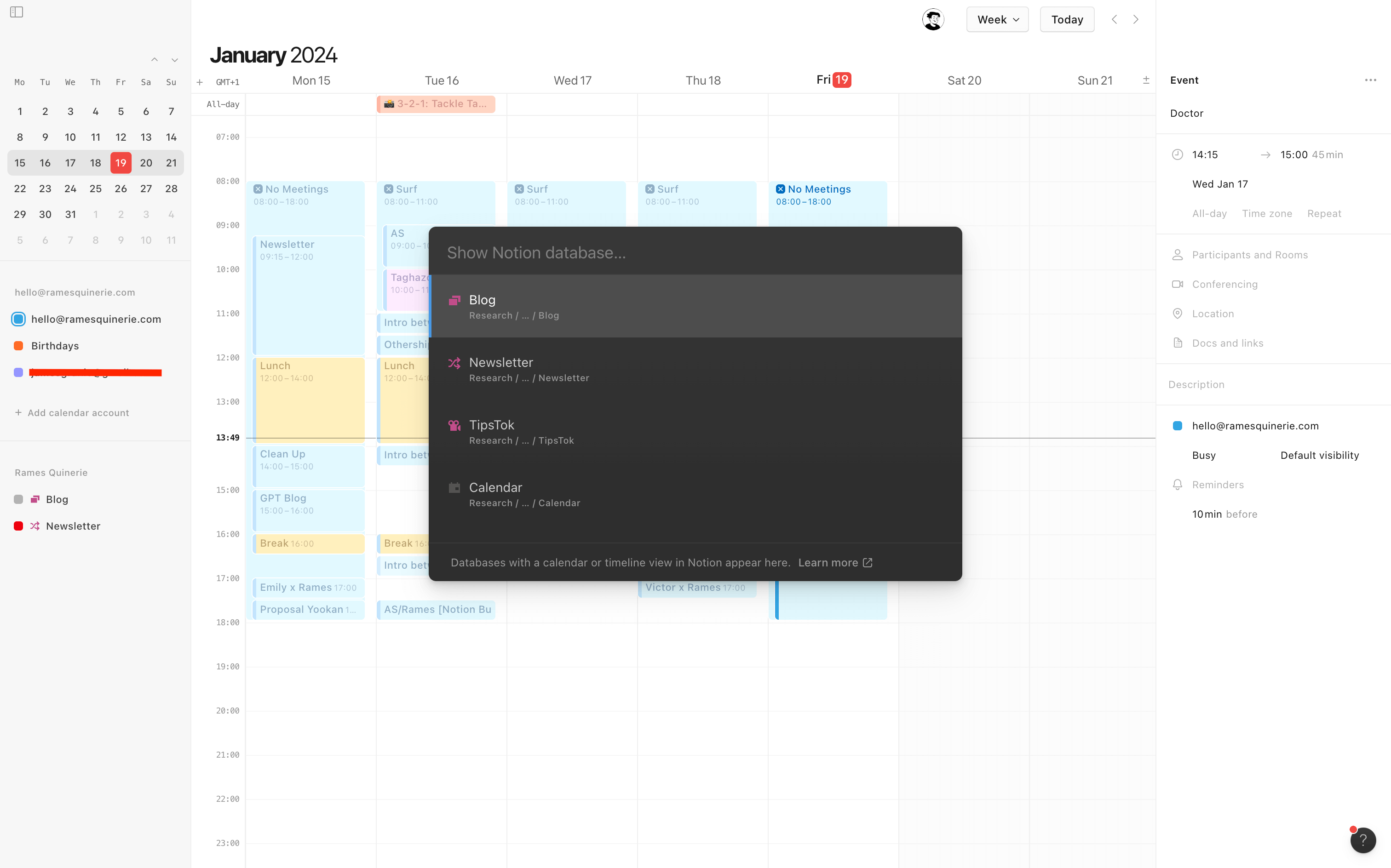
If you have always found Notion's calendar view a bit clunky and not really useful as a calendar, you're not alone. Seeing the timespan of events was bad, and editing the time was even worse.
Which brings me to the most exciting thing about Notion Calendar: its ability to connect, see, and sync additional Notion databases!
Connect your Notion databases
- Connect Notion Calendar to your Notion account.
- Click the "Add Notion database" in the bottom-left corner (or simply press "o").
- Select your desired database.
Ta-da! They are now on your Notion Calendar. And you can now easily change their date/time, update their titles, but also create additional database items directly from your Calendar.
Add items from Notion Calendar
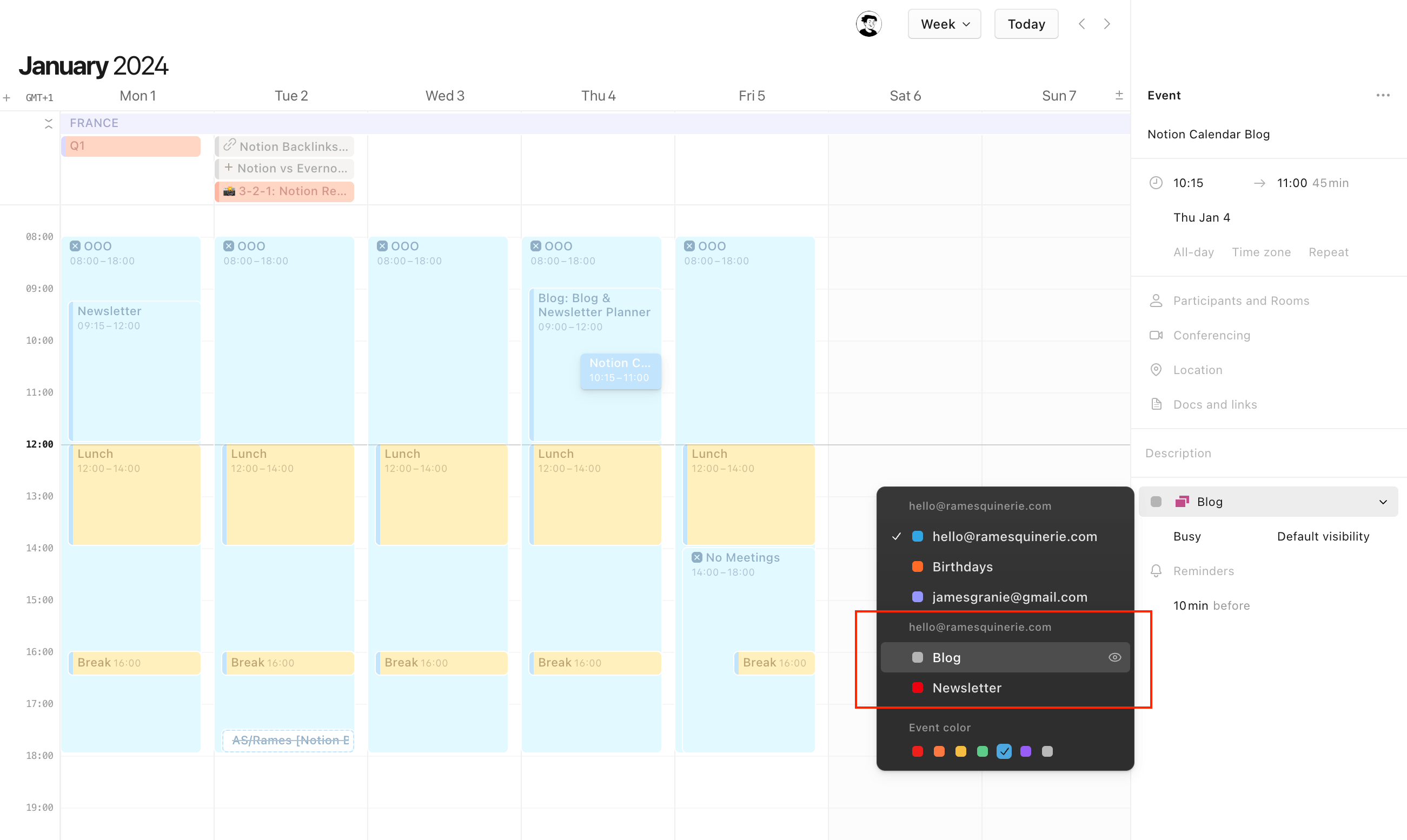
- Create a new event in Notion Calendar (click and drag to the desired day and time slot).
- Give it a name.
- Instead of your main calendar account, select the desired Notion database.
Specifications / Limitations
There are a few things to note / limitations you should be aware of before adding databases to your Notion Calendar:
- Your (master) Notion database needs to have a Calendar or Timeline view (otherwise, they won't show up in the databases you want to select).
- If there is a filter on your source database view, it will also be applicable to Notion Calendar (i.e., excluded events from the Notion database won't be shown in Notion Calendar).
- However, it doesn't automatically apply the filter to newly created items (e.g., if you have a filter on your Status to see only "Completed" items, creating a new item in Notion Calendar will not automatically assign the "Completed" status to that item). This also means the newly created item will automatically disappear from your Notion Calendar as it won't have the required "Completed" status (but don't worry, they still exist in your Notion database).
- If you have a default template in your connected database view, the template will also be applied to new items (those created from Notion Calendar).
Collaborating in Notion Calendar
Notion Calendar has really nice features that allow for better collaboration. Below are my top 4.
Access teammates calendars
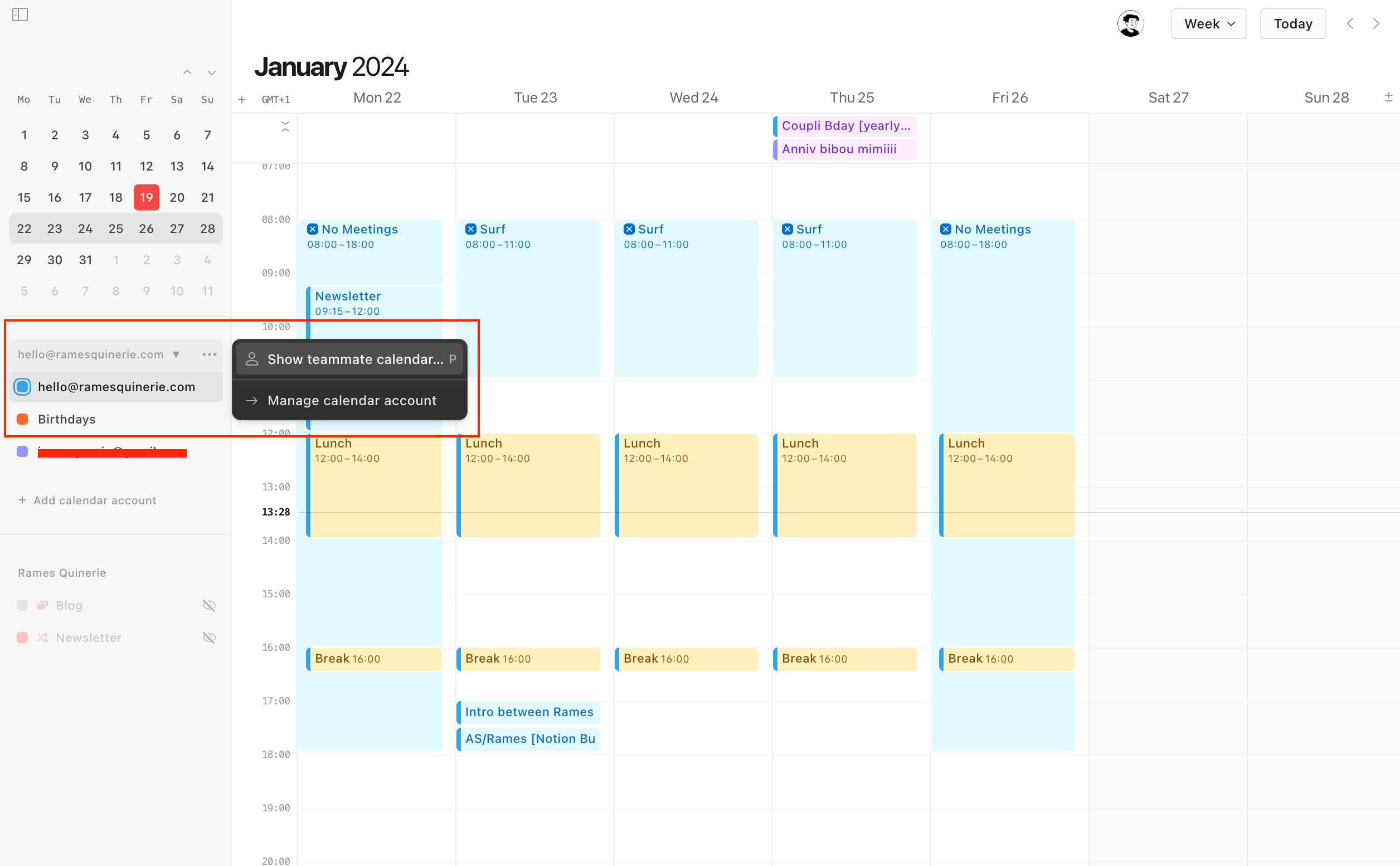
After connecting your Notion Calendar to your teammates' calendars, you'll be able to easily overlay their calendars with your own to find time to connect and schedule meetings.
- Access teammate's calendar: In the left sidebar of Notion Calendar, click •• next to your own calendar. Select "Show teammate calendar...". Then, search for and select your teammate's email. Finally, press "esc" or select the "x" next to their calendar in the left sidebar when you're finished.
- Add teammate's calendar: To view a teammate's calendar, follow these steps: view the calendar, right-click their email, and select "Pin to calendar list". To remove a teammate's calendar, right-click their calendar and select "Remove teammate from list".
- Create 1:1 meetings: Drag a teammate from the Notion Calendar menu onto your grid to schedule a 1:1 meeting. The meeting details and conferencing will be automatically added based on your preferences.
Work with multiple timezones
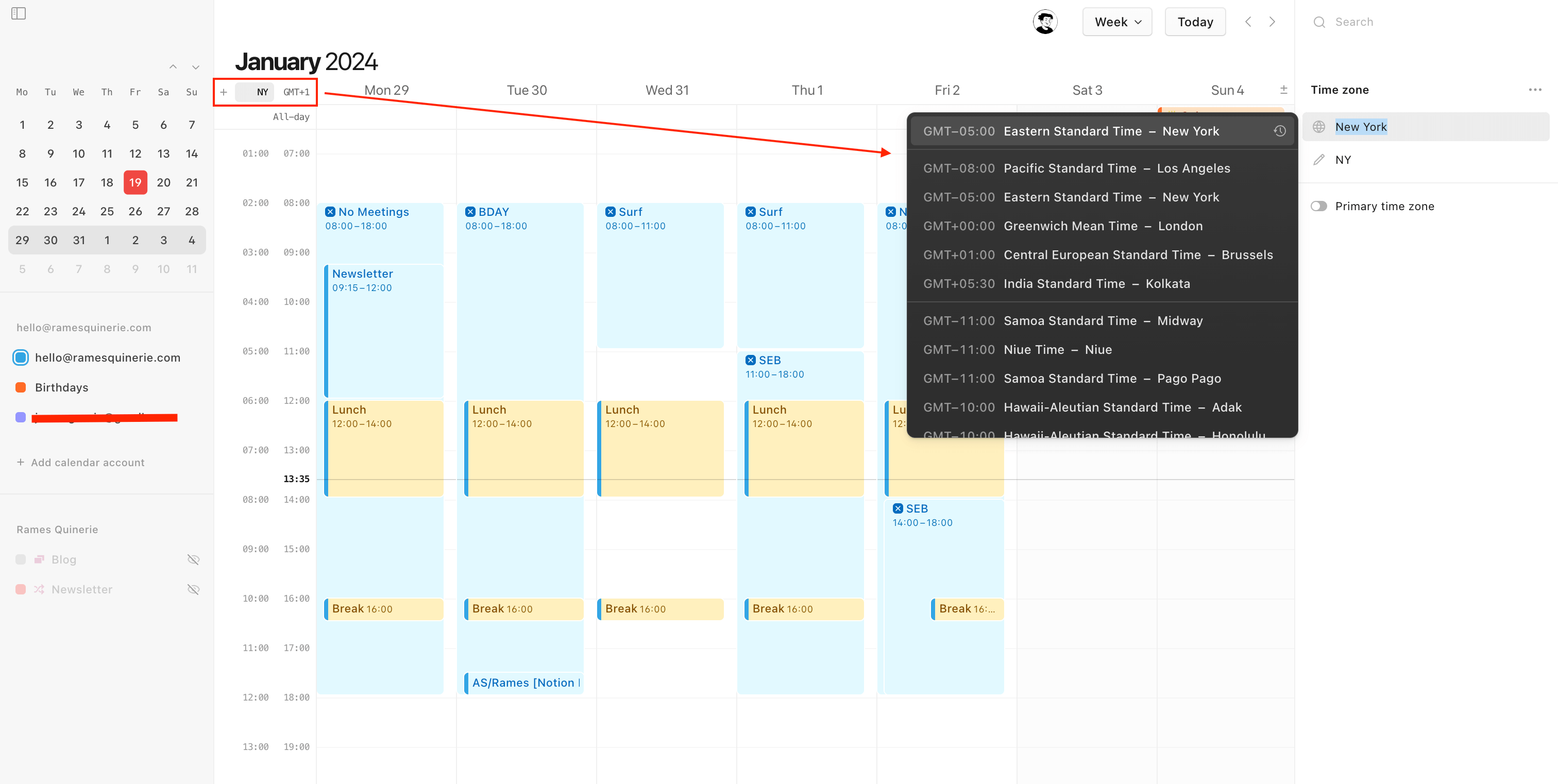
If you're a remote team or simply work with people outside of your timezone, you can easily view and switch between timezones.
- Edit your primary timezone: At the top-left, just below the month field, click on your current timezone (in my case GMT+1). It will open a sidebar on the right where you can modify the timezone.
- Add more timezones: To the left of your timezone, click the "+" button to add more timezones. Simply input a city or timezone, then rename it to your liking (e.g., GMT -5 can become NY for New York). You can also make the newly created timezone the primary one if needed.
Sharing availabilities
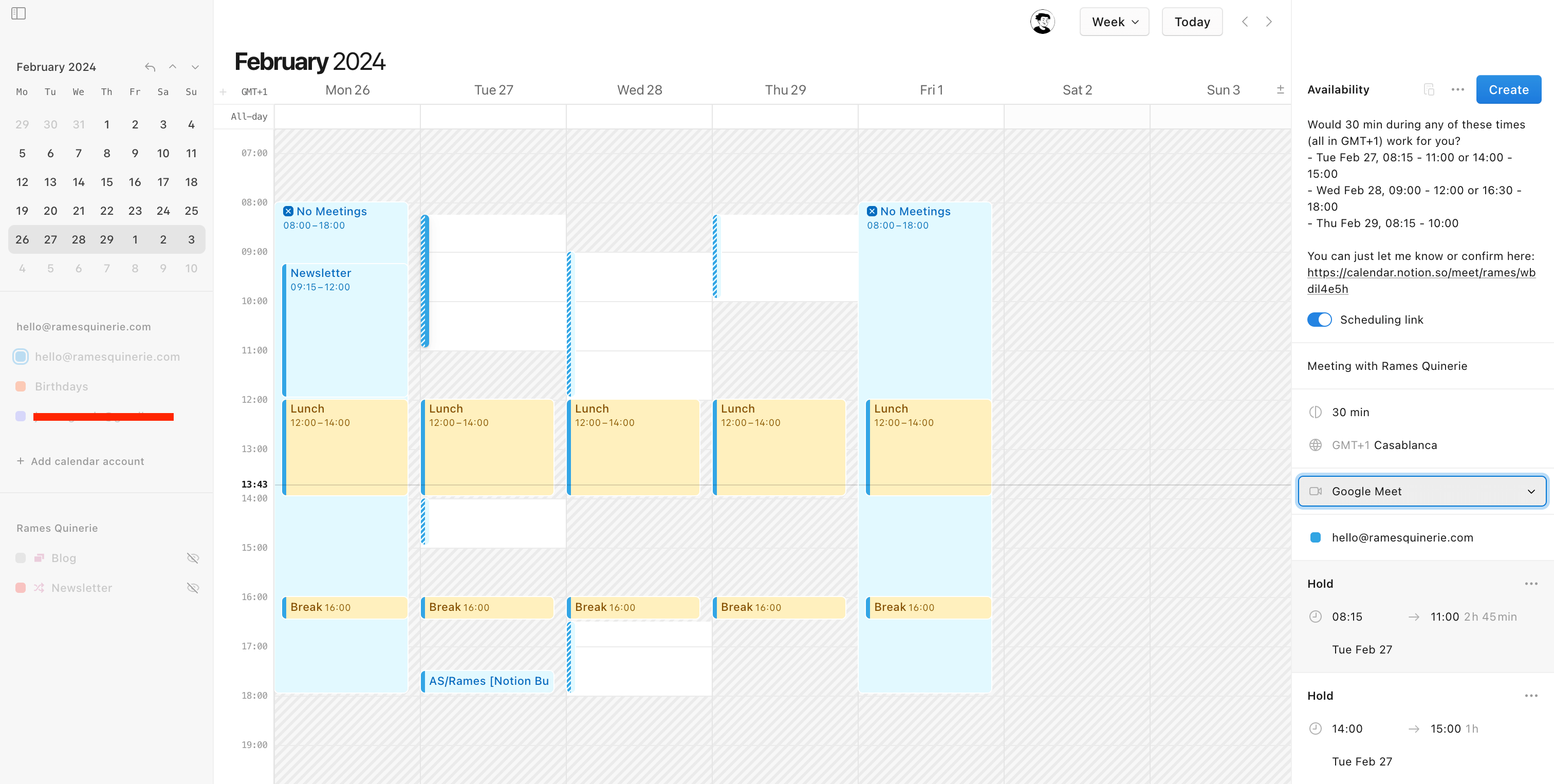
One very cool feature is the ability to easily share availabilities with others, especially external people. Click the "Share availability" button on the right sidebar (or simply press "s"). The background will become gray, and you can select the times you'd like to share with others by dragging your mouse.
When you're done, check your right sidebar and either:
- copy & paste the auto-generated text (all availabilities are displayed as text)
- send the scheduling link
- or both!
You can set up a default conferencing tool (e.g., Google Meet) and the duration of the meeting.
Blocking events
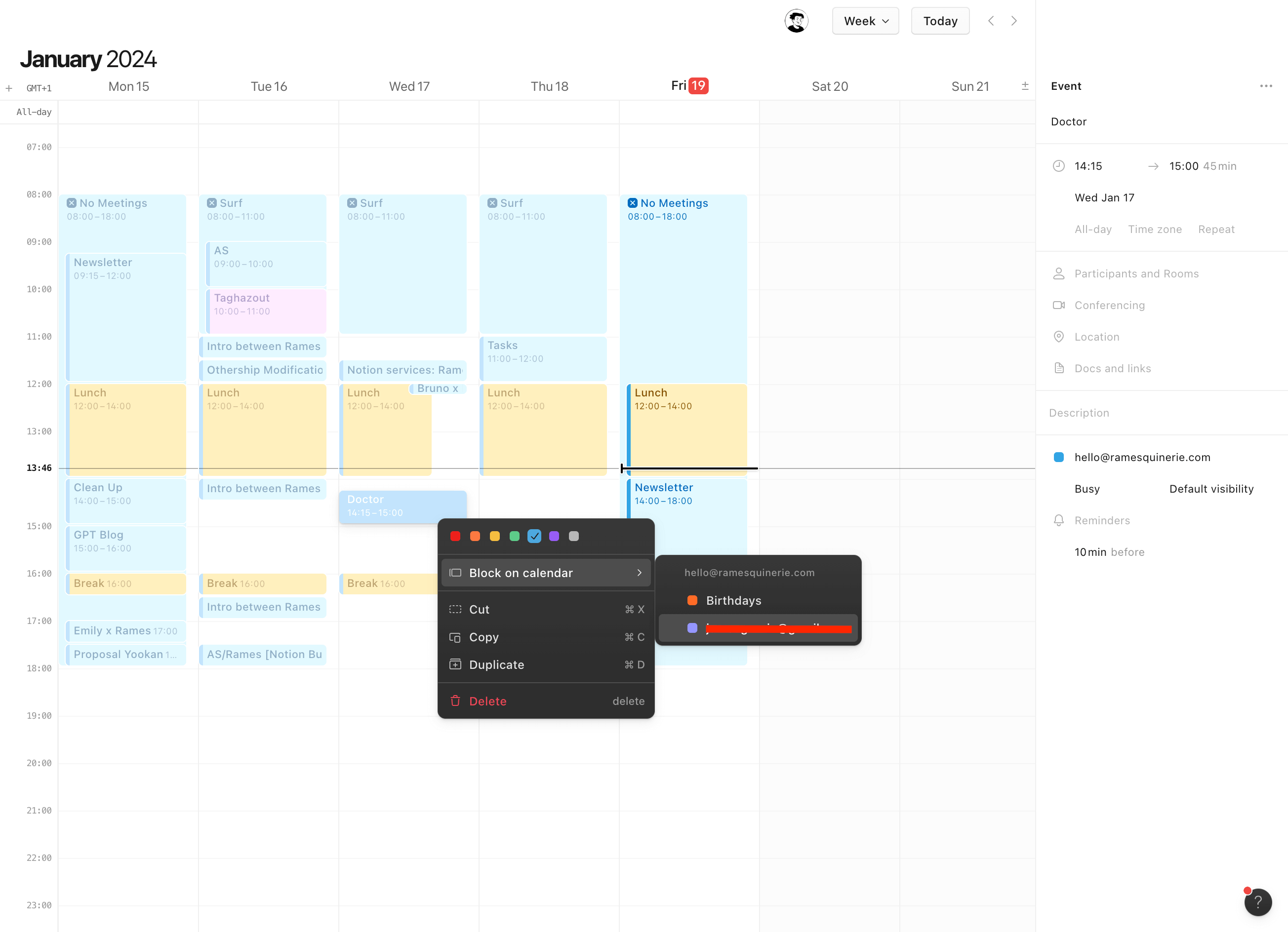
If you don't want teammates to see specific events in your calendar (e.g., doctor appointments, personal meetings, etc.), you can "block" them and hide their title and/or details.
Simply right-click the event, then select "Block on calendar" and choose the desired calendar to block on. You can choose to show only "Busy" or include all event details.
Attach Notion pages to events
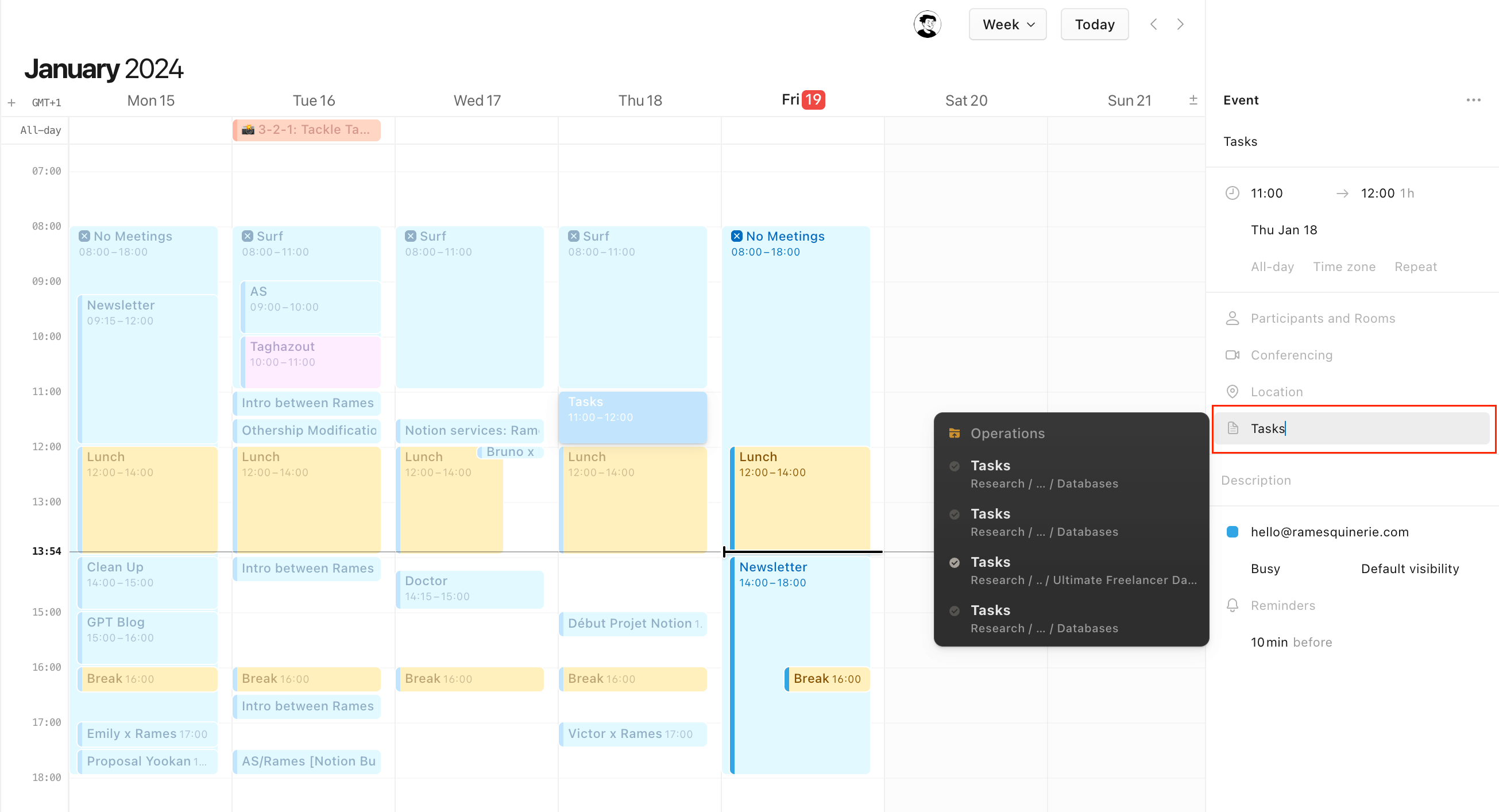
One of Cron's best features is still here — you can attach or create any Notion page or database item to your meetings. Click on any of your events, then, in the right sidebar, click on Docs & Links. You'll then be prompted to:
- Search for your Notion page
- Create a new one
- Paste a link
It's super intuitive to use and a game-changer for personal and meeting notes.
Bonus tip: Revert to Cron logo

If you miss the old, vintage Cron logo, I have something for you. You can revert to the old logo by:
- cmd/ctrl + k
- typing: defaults write app dockIcon style1
Unfortunately, this doesn't save when you quit the app and restart it. But still a nice thing to know 👀
List of Notion Calendar shortcuts
Below is a list of the most useful (not all) Notion Calendar shortcuts:
- m → to switch to the monthly view
- w → to switch back to the weekly view
- d → to switch to today’s view
- arrows → to navigate the weeks
- t → to come back to today
- o → to show a new Notion database
- cmd + K → to open the command center
- s → to share availabilities
- z → to show a new timezone
- p → to show a teammate calendar
Conclusion
Notion Calendar is an exciting new app that offers a refreshing take on calendar management. With its ability to connect and sync with additional Notion databases, it provides a more flexible and customizable calendar experience.
The collaboration features, such as accessing teammates' calendars and sharing availabilities, enhance teamwork and scheduling efficiency. Furthermore, the option to attach Notion pages to events allows for seamless organization and note-taking.
Although there are a few limitations to keep in mind, Notion Calendar presents a promising solution for individuals and teams seeking a versatile and user-friendly calendar tool.
Give it a try and discover a new way to manage your time and tasks!
Start now & create your Notion account 🙃
(#NotionPartner)
Notion Calendar is a new standalone app that succeeds Cron, the Calendar app Notion acquired in 2022. As of January 2024, you can access it for free on the web, Mac, Windows, and iOS. They are also developing an Android version. Currently, Notion Calendar only integrates and syncs with Google Calendar accounts, but integration with Outlook and iCloud is planned.
Notion Calendar comes with impressive features such as the ability to connect and sync your Notion databases with it. This makes it easy to view and manage your tasks and events all in one place. You can also overlay and access your teammates' calendars, manage multiple time zones effortlessly and share your availabilities with ease. Importantly, you can enhance your meeting notes and organization by attaching or creating Notion pages directly within your events.
There are a few limitations: 1) Your master Notion database needs to have a Calendar or Timeline view, otherwise they won't show up in the databases you want to select. 2) If there is a filter on your source database view, it will also be applicable to Notion Calendar. 3) It doesn't automatically apply the filter to newly created items. For example, if you have a filter on your Status to see only 'Completed' items, creating a new item in Notion Calendar will not automatically assign the 'Completed' status to that item, causing it to disappear from your Calendar view. 4) If you have a default template in your connected database view, the template will also be applied to new items created from Notion Calendar.

